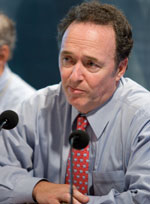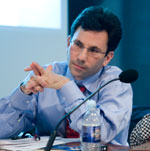Congress and the Budget: Deficit Attention Disorder?
with Rep. Dan Lungren, R-Calif.; Robert Reischauer, President, The Urban Institute; Eric Patashnik, Dept. of Politics, University of Virginia;David Rogers, reporter, Wall Street Journal
Overview
The congressional budget process is in shambles: Congress has still not adopted its final budget resolution—five months after the April 15th statutory deadline; only two of the eleven annual spending bills are slated to be signed into law before the October election recess; annual deficits hover around $300 billion a year with no major deficit reduction efforts underway; the number of pork barrel projects has grown exponentially over the last decade; and no steps are being taken to address the impending insolvency of Social Security and Medicare.
These conditions would seem likely to produce the perfect storm of public outrage against Congress. Yet ironically, few seem to care, either inside or outside Congress. Deficits and congressional spending excesses are not registering as significant issues in the upcoming mid-term congressional elections. These are some of the conclusions of participants on the panel of the Congress Project seminar "Congress and the Budget: Deficit Attention Disorder?" at the Wilson Center September 18.
 Congressman Dan Lungren, a Republican from Sacramento, California and a member of the House Budget Committee, said his constituents do raise government spending as one of three issues of concern (along with Iraq and immigration) at his town hall meetings. However, there was no consensus on what should be cut or how. Lungren, who first served in the House from southern California from 1978 to 1988 returned to California where he served eight years as the state's Attorney General. He returned to the U.S. Congress in 2005. "I was amazed at how much had changed since I left," Lungren said. "When I was here before only a few powerful Members received "earmarks" [special district project funds]. Now every Member seems to expect and get several earmarks each year." While Lungren found this trend disturbing, he added that the real problem in budgeting is with entitlements or mandatory spending, especially Medicare and Medicaid because health care costs are skyrocketing. Unless Congress gets a handle on that, we're in for serious trouble down the road as entitlements consume more and more of our federal budget.
Congressman Dan Lungren, a Republican from Sacramento, California and a member of the House Budget Committee, said his constituents do raise government spending as one of three issues of concern (along with Iraq and immigration) at his town hall meetings. However, there was no consensus on what should be cut or how. Lungren, who first served in the House from southern California from 1978 to 1988 returned to California where he served eight years as the state's Attorney General. He returned to the U.S. Congress in 2005. "I was amazed at how much had changed since I left," Lungren said. "When I was here before only a few powerful Members received "earmarks" [special district project funds]. Now every Member seems to expect and get several earmarks each year." While Lungren found this trend disturbing, he added that the real problem in budgeting is with entitlements or mandatory spending, especially Medicare and Medicaid because health care costs are skyrocketing. Unless Congress gets a handle on that, we're in for serious trouble down the road as entitlements consume more and more of our federal budget.
 Dr. Robert Reischauer, now president of the Urban Institute and previous director of the Congressional Budget Office from 1989 to 1995, said he has grown very "cynical" about the congressional budget process because so many games are being played. "Congress will set an overall spending limit and then find all kinds of creative ways to circumvent it." Notwithstanding his discouragement, Reischauer said the budget process should not be scrapped because, "as bad as the current process is, things would be even worse without the process," which he said still provides some constraints. In trying to explain why Congress was not acting to bring spending problems under control, Reischauer said "there is no impetus to do anything. There are no tangible consequences for doing nothing, whereas doing something can have short- term negative political results because you'll either be raising taxes, cutting benefits, or more likely, doing both." With the economy going pretty strong, and inflation, interest rates, and unemployment down, observed Reischauer, Americans do not sense there is a fiscal crisis looming. So they are not demanding that their representatives in Congress do something about it. Moreover, the fragility of congressional party majorities makes it nearly impossible for either party to make a move, and they're certainly not showing any signs of working together to solve things so long as the control of both houses of Congress hangs in the balance.
Dr. Robert Reischauer, now president of the Urban Institute and previous director of the Congressional Budget Office from 1989 to 1995, said he has grown very "cynical" about the congressional budget process because so many games are being played. "Congress will set an overall spending limit and then find all kinds of creative ways to circumvent it." Notwithstanding his discouragement, Reischauer said the budget process should not be scrapped because, "as bad as the current process is, things would be even worse without the process," which he said still provides some constraints. In trying to explain why Congress was not acting to bring spending problems under control, Reischauer said "there is no impetus to do anything. There are no tangible consequences for doing nothing, whereas doing something can have short- term negative political results because you'll either be raising taxes, cutting benefits, or more likely, doing both." With the economy going pretty strong, and inflation, interest rates, and unemployment down, observed Reischauer, Americans do not sense there is a fiscal crisis looming. So they are not demanding that their representatives in Congress do something about it. Moreover, the fragility of congressional party majorities makes it nearly impossible for either party to make a move, and they're certainly not showing any signs of working together to solve things so long as the control of both houses of Congress hangs in the balance.
 Eric Patashnik, a professor of politics at the University of Virginia and associate director of the school's new Public Policy Program, noted that while the budgetary problem might seem similar to what the country faced in the 1980s and early 1990s, "it's not deja vu all over again." There are several changed circumstances that make all the difference in terms of public concern. As shocking as current deficit and national debt figures seem, they consume a decreasing percentage of the Gross Domestic Product (GDP). With the baby boomers now coming into retirement, Congress is not about to impose draconian cuts on their benefits. Nevertheless, if the rise in entitlement spending continues at the current rate, in 20 years they will devour the entire budget, leaving nothing for discretionary spending on such vital things as defense, education, public safety, and infrastructure. While Congress is unlikely to allow that to happen, it does not feel the urgency to head it off now. Congress is best at reacting to immediate crises, not long range problems over the horizon. Another part of the problem, said Patashnik, is that there are fewer moderates in Congress in either party. They were the ones who could be counted on in the past to help forge bipartisan compromises and solutions to tough challenges. While there is a consensus that the budget process has collapsed and that entitlement spending is the main problem not being addressed, there is no consensus on what to do about it. Patashnik said the prospect of divided party government could actually help since it could diffuse responsibility and blame for making the hard choices.
Eric Patashnik, a professor of politics at the University of Virginia and associate director of the school's new Public Policy Program, noted that while the budgetary problem might seem similar to what the country faced in the 1980s and early 1990s, "it's not deja vu all over again." There are several changed circumstances that make all the difference in terms of public concern. As shocking as current deficit and national debt figures seem, they consume a decreasing percentage of the Gross Domestic Product (GDP). With the baby boomers now coming into retirement, Congress is not about to impose draconian cuts on their benefits. Nevertheless, if the rise in entitlement spending continues at the current rate, in 20 years they will devour the entire budget, leaving nothing for discretionary spending on such vital things as defense, education, public safety, and infrastructure. While Congress is unlikely to allow that to happen, it does not feel the urgency to head it off now. Congress is best at reacting to immediate crises, not long range problems over the horizon. Another part of the problem, said Patashnik, is that there are fewer moderates in Congress in either party. They were the ones who could be counted on in the past to help forge bipartisan compromises and solutions to tough challenges. While there is a consensus that the budget process has collapsed and that entitlement spending is the main problem not being addressed, there is no consensus on what to do about it. Patashnik said the prospect of divided party government could actually help since it could diffuse responsibility and blame for making the hard choices.
 David Rogers, veteran congressional and political correspondent for the Wall Street Journal, said he had "minimum high regard" for the budget process because it makes little difference in the overall budgetary picture. Congress would be better off giving more power to the appropriations committees, even over mandatory spending. He did think the old "Pay-as-you-go" rules (PAYGO) should be fully restored whereby any cut in taxes or increase in entitlements had to be offset by tax increases, entitlement cuts, or a combination of both. There should be a way, though, he said, to preserve some of the tax cuts expiring in 2010 without requiring offsets. Congress should also reconsider cost-of-living (COLA) freezes on entitlements from time to time to make necessary savings. Finally, he thought a variation on the old-Gramm-Rudman emergency deficit control rules would help—-specifying a set amount of savings each year, rather than an unrealistic downward glide-path in deficits to a balanced budget. Rogers and Reischauer both thought the key to addressing budget problems could be strong leadership on deficits from the next President—-someone who could bring both parties together to get things done.
David Rogers, veteran congressional and political correspondent for the Wall Street Journal, said he had "minimum high regard" for the budget process because it makes little difference in the overall budgetary picture. Congress would be better off giving more power to the appropriations committees, even over mandatory spending. He did think the old "Pay-as-you-go" rules (PAYGO) should be fully restored whereby any cut in taxes or increase in entitlements had to be offset by tax increases, entitlement cuts, or a combination of both. There should be a way, though, he said, to preserve some of the tax cuts expiring in 2010 without requiring offsets. Congress should also reconsider cost-of-living (COLA) freezes on entitlements from time to time to make necessary savings. Finally, he thought a variation on the old-Gramm-Rudman emergency deficit control rules would help—-specifying a set amount of savings each year, rather than an unrealistic downward glide-path in deficits to a balanced budget. Rogers and Reischauer both thought the key to addressing budget problems could be strong leadership on deficits from the next President—-someone who could bring both parties together to get things done.
Thank you for your interest in this event. Please send any feedback or questions to our Events staff.










